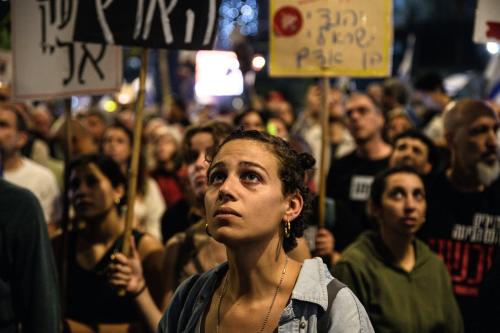In Egypt, a general once again holds sway, after Egypt’s military deposed the democratically elected government of Mohamed Morsi in the summer of 2013. Syria remains mired in a devastating civil war. Fellow Shadi Hamid, director of research for the Brookings Doha Center, appeared in a panel discussion on NPR News’ “Tell Me More” with Michelle Martin to address the big issues in the Middle East.
Hamid spoke to support for democracy in the Egyptian and broader contexts of the Arab Spring uprisings that began three years ago:
Everyone says they support democracy in theory … but I think the real challenge in the Middle East is what happens when the people you don’t like win elections and they keep on winning elections, then democracy becomes very real, and it becomes existential because you’re worried the other group is going to destroy you.
“In these kinds of zero sum contexts,” he continued, “democracy and elections can be very frightening for people. So that’s why we saw such a remarkable shift where you had the vast majority of so-called liberals in Egypt passionately supporting a military coup and the subsequent crackdown. … we’re six months after the coup and you really see millions of Egyptians who are buying into this personality cult of the new strongman, General Sisi.”
On the rise of other radicals, particularly in Syria, Libya, Yemen, and Egypt
At the start of the Arab uprisings, in a lot of countries, people tried peaceful protests—in Syria for example—but they kept on getting shot at and killed in very large numbers. And when that keeps on happening, people start to question the peaceful approach and then you start to see the rise of radicals who say violence is the only way. …
In a place like Egypt you have something similar, where people try five consecutive democratic elections which are reasonably free and fair. That doesn’t work out, the military steps in. Then the real question now is, do those on the receiving end of the coup question their commitment to democracy and start to think about resorting to violence? That’s what we’re going to have to watch very closely in Egypt.
Are oil and war still the right lens for looking at the region of the Middle East?
I think one way to look at it is not to compare the Arab Spring to Eastern Europe in the 1990s. I think the better comparison is to the revolutions of 1848 in Europe, which were very tumultuous and very bloody and they unfolded over decades. The Middle East has so many fundamental divides, and I think one of the most troubling is the divide over the role of religion in public life. That hasn’t been resolved yet. So people have to kind of think about, “What is the meaning of the nation state and what are the fundamental bases for building a new state?” And that’s why it becomes so violent because these existential issues haven’t been worked out yet.
Listen to the full interview below, from NPR.org. Hamid’s portion begins at 7:30.



Commentary
Arab Spring Like 1848 Revolutions In Europe
January 2, 2014